"IDENTITY" is a most enjoyable and unusual cleverly written murder mystery thriller in the Hitchcock tradition with a touch of Agatha Christie thrown in. The film was expertly directed by James Mangold. Most of the action takes place in an isolated motel (shades of "Psycho" here) where 10 unrelated travellers are stranded in a harsh thunderstorm one night. Are they there by chance or is there a more sinister and complicated reason than that? Are they linked in some other way unknown to them? One by one the strangers are murdered for no apparent reason in a theme similar to Agatha Christie's famous classic "And Then There Were None" (1945). In fact a character in the movie actually mentions this film to one of her fellow travellers. If you enjoy thrillers I can certainly recommend "Identity" but you will need to concentrate fully to appreciate all its many plot twists, turns and surprises. The entire cast give superb performances including John Cusack who plays a limo driver, Rebecca DeMornay (an 80's pampered TV star), Ray Liotta (a cop transporting a dangerous criminal to jail), Jake Busey (the criminal), Amanda Peet (a call girl), and various others including a pair of newly weds and a family in trouble. The motel is run by an agitated and nervous night manager (John Hawkes) who is not all he seems. Is there any connection between the 10 strangers and what is the significance of the motel keys found with each body? To top it all "Identity" comes up with one of the best shock endings I have seen for some time. In true Hitchcock tradition clues are given here and there and several flashbacks add to the mystery. A very clever and intriguing plot helps to make this film a gratifying experience. Five stars.
Favourite lines:
John Cusack (voiceover): "As I was going up the stair, I met a man who wasn't there. He wasn't there again to-day. I wish, I wish he'd go away".
Clea DuVall (to group); "Remember that movie where the ten strangers went to an island and then they all died one by one and then it turned out they weren't strangers, but they all had a connection?".
Rebecca De Mornay (to Cusack): "I'm not staying here. Are you out of your mind? This is my car. You work for me!".
Cusack (to John Hawkes): "He's unconscious Larry. He's tied to a post".
DuVall (to William Lee Scott): "Something is happening - I want to get out of here!".
IDENTITY
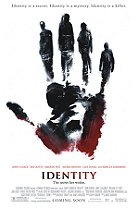 Posted : 16 years, 11 months ago on 24 July 2008 05:49
(A review of Identity)
Posted : 16 years, 11 months ago on 24 July 2008 05:49
(A review of Identity) 0 comments, Reply to this entry
0 comments, Reply to this entry
IT'S A MAD MAD MAD MAD WORLD
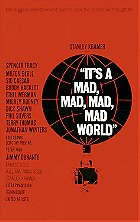 Posted : 16 years, 11 months ago on 23 July 2008 07:12
(A review of It's a Mad, Mad, Mad, Mad World)
Posted : 16 years, 11 months ago on 23 July 2008 07:12
(A review of It's a Mad, Mad, Mad, Mad World)Director Stanley Kramer is probably best known for his serious dramas such as "Champion", "The Defiant Ones", "Inherit the Wind" and "Judgement at Nuremberg" etc so this film came as a complete change of pace for him. Stanley Kramer is to be congratulated for putting together such a brilliant cast of comedians in the one film. This is definitely a movie not to be missed. When Smiler Grogan (Jimmy Durante) crashes his car on the highway an ill assorted group of diverse travellers gather around him to hear his last words. When he tells them of some buried treasure under a "big W" at Santa Rosita park they all resolve to be the first there to dig up the money. The chase is then on by plane, car, truck and whatever means they can find to get them to the park quickly and look for the loot. Police Captain Culpeper (Spencer Tracy) keeps an eye on them all from a safe distance so that he can grab the money for himself once it is found. J. Russell Finch (Milton Berle) has to put up with nagging mother-in-law Mrs Marcus (Ethel Merman), his wife Emmeline Finch (Dorothy Provine), and the interference of the very British J. Algernon Hawthorne (Terry-Thomas), while dentist Melville Crump (Sid Caesar) and wife Monica Crump (Edie Adams) get trapped in a hardware store looking for tools to dig up the treasure. Truck driver Lennie Pike (Jonathan Winters - in his first screen role) meets up with con man Otto Meyer (Phil Silvers) who naturally wants to get in on the chase and claim a share of the proceeds. Benjy Benjamin and Ding Bell (Buddy Hackett and Mickey Rooney) charter a light aircraft hoping that will give them the advantage but are panic stricken when their pilot Tyler Fitzgerald (Jim Backus) is accidentally knocked unconscious during the flight leaving Benjy to pilot the plane!! There were many cameo appearances throughout the film including Jerry Lewis, Jack Benny, Buster Keaton, Peter Falk, the Three Stooges, Paul Ford, Stan Freburg, Leo Gorcey, Don Knotts, Carl Reiner, Zasu Pitts (her final film), Mike Mazurki, Edward Everett Horton, Charles McGraw, Norman Fell, Howard da Silva, Allen Jenkins, Eddie "Rochester" Anderson and several others. Judy Garland, Bob Hope, George Burns and Red Skelton were all offered roles in the film but declined. Stan Laurel also turned down an invitation to be in the film as he had pledged that when Oliver Hardy died in 1957 he would never perform again. He never did.
Favourite lines:
Milton Berle (to group at scene of car crash): "Hey, did you see it? The way he went sailing right out there! He just went sailing right out there".
Buddy Hackett (to group): "Now look! We've figured it 17 different ways, and each time we figured it, it was no good, because no matter how we figured it, somebody don't like the way we figured it! So now, there's only one way to figure it. And that is, every man, including the old bag, for himself!".
Ethel Merman (to Terry-Thomas): "Where did you get that funny accent? Are you from Harvard or something?".
Phil Silvers (to Jonathan Winters): "Try me - I'm pretty gullible".
Jim Backus (to Mickey Rooney and Buddy Hackett): "Who says this boy can't fly this old plane? There you go!".
Buddy Hackett (to Rooney): "What, am I supposed to do everything? You want me to fly the airplane, you want me to work the radio, what are you gonna .... What are you, the hostess?".
Incidentally, I can recommend a new biography I have just read on Ethel Merman called "Brass Diva" by Caryl Flinn. Also "Mickey Rooney" by Alvin H. Marill is worth looking at.
Favourite lines:
Milton Berle (to group at scene of car crash): "Hey, did you see it? The way he went sailing right out there! He just went sailing right out there".
Buddy Hackett (to group): "Now look! We've figured it 17 different ways, and each time we figured it, it was no good, because no matter how we figured it, somebody don't like the way we figured it! So now, there's only one way to figure it. And that is, every man, including the old bag, for himself!".
Ethel Merman (to Terry-Thomas): "Where did you get that funny accent? Are you from Harvard or something?".
Phil Silvers (to Jonathan Winters): "Try me - I'm pretty gullible".
Jim Backus (to Mickey Rooney and Buddy Hackett): "Who says this boy can't fly this old plane? There you go!".
Buddy Hackett (to Rooney): "What, am I supposed to do everything? You want me to fly the airplane, you want me to work the radio, what are you gonna .... What are you, the hostess?".
Incidentally, I can recommend a new biography I have just read on Ethel Merman called "Brass Diva" by Caryl Flinn. Also "Mickey Rooney" by Alvin H. Marill is worth looking at.
 0 comments, Reply to this entry
0 comments, Reply to this entry
THE LIST OF ADRIAN MESSENGER
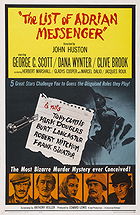 Posted : 16 years, 11 months ago on 22 July 2008 01:26
(A review of The List of Adrian Messenger)
Posted : 16 years, 11 months ago on 22 July 2008 01:26
(A review of The List of Adrian Messenger)"The List of Adrian Messenger" is a superb mystery thriller starring Kirk Douglas and George C. Scott. Adrian Messenger (John Merivale) is mysteriously killed in a plane crash and Anthony Gethryn (George C. Scott) who is a friend of the family is asked to investigate. Gethryn had been given a list of names by Messenger at the house prior to Messenger's fatal plane journey. The men named on the "list" are all being murdered one by one and Gethryn has to use all his investigative powers to try and track down the killer and stop him before others on the list are also murdered. Unfortunately, more murders do take place and Gethryn is assisted by Raoul LeBorg (Jacques Roux) and Lady Jocelyn Bruttenholm (Dana Wynter) to help him solve the mystery. Your enjoyment of the film is enhanced by the appearance of several famous stars in cameo roles (all heavily disguised) and part of the fun is to identify who they all are before the "unmasking" at the end of the movie! Kirk Douglas also appears in several disguises throughout the film and seemed to be enjoying his various roles. The fine supporting cast includes Herbert Marshall, Clive Brook and Gladys Cooper. The film was proficiently directed by John Huston who also appeared in the climatic hunting scene. "The List of Adrian Messenger" could be favourably compared with the old fashioned mystery thrillers of the forties and is none the less enjoyable for that. It is almost like having Alfred Hitchcock and Agatha Christie combined in the one film. Now here is a puzzle for you "movie buffs" to ponder over. Although we are led to believe that Tony Curtis, Robert Mitchum, Frank Sinatra and Burt Lancaster appear in disguise during the film (and indeed these stars are "unmasked" at the end) I have a sneaking suspicion that we were fooled into thinking that all these stars were really in the film and I am convinced that neither Frank Sinatra or Burt Lancaster actually took part in the film at all but only appeared right at the end for the final unmasking! If you look closely it would seem very likely that other actors were used to stand in for Sinatra and Lancaster. Take a look for yourself and see what you think! There is no doubt that Tony Curtis and Robert Mitchum were in the film as they could easily be recognised through their disguises. Apart from this little deception "The List of Adrian Messenger" is an absorbing and unusual film with a first rate cast and is well worth seeing.
Favourite lines:
John Merivale (to George C. Scott): "Anyway, if I'm right about this it's a far older sin than politics".
Herbert Marshall (to Scott): "If you really think that all these deaths were tied together it would involve a mass murder plot so preposterous as to defy belief".
Scott (to Jacques Roux): "When you count yourself in - you really mean in, don't you?".
Kirk Douglas (to audience): "Ladies and gentlemen - the end".
Favourite lines:
John Merivale (to George C. Scott): "Anyway, if I'm right about this it's a far older sin than politics".
Herbert Marshall (to Scott): "If you really think that all these deaths were tied together it would involve a mass murder plot so preposterous as to defy belief".
Scott (to Jacques Roux): "When you count yourself in - you really mean in, don't you?".
Kirk Douglas (to audience): "Ladies and gentlemen - the end".
 0 comments, Reply to this entry
0 comments, Reply to this entry
THE TREASURE OF THE SIERRA MADRE
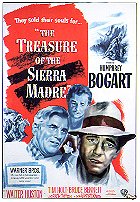 Posted : 16 years, 11 months ago on 22 July 2008 09:05
(A review of The Treasure of the Sierra Madre (1948))
Posted : 16 years, 11 months ago on 22 July 2008 09:05
(A review of The Treasure of the Sierra Madre (1948))"The Treasure of the Sierra Madre" won Oscars for best director (John Huston), best supporting actor (Walter Huston) and best screenplay (John Huston). The film was also nominated for Best Picture but unfortunately lost out to Laurence Olivier's "Hamlet". This was yet another marvellous performance by Humphrey Bogart in a difficult role and proved once again what an outstanding actor he can be when given the right material. Fred C. Dobbs (Humphrey Bogart) and Bob Curtin (Tim Holt) are two Americans down on their luck in Tampico, Mexico, who manage to acquire a temporary job working for Pat McCormick (Barton MacLaine) but don't get paid for their efforts as McCormick does a disappearing act with the money. Dobbs and Curtin catch up with him later in a bar and after coming to blows manage to get the money that was owed to them. A young Mexican boy (Robert Blake) approaches Dobbs who reluctantly buys a lottery ticket from him. Dobbs and Curtin spend the night in a flop house where they meet Howard (Walter Huston), a grizzled old timer who tells them stories of the times he went prospecting for gold in the mountains. They are both fascinated by Howard's stories but don't have the necessary funds to purchase the equipment they would need to look for gold. Next day the young Mexican boy comes to find Dobbs to tell him that his ticket has won some money in the lottery. It is not a fortune but enough to invest in some tools and equipment so that Curtin and Dobbs can team up with Howard to search for gold in the Sierra Madre Mountains. Greed and distrust inevitably take hold of Dobbs and he gets increasingly paranoid as the days go by. He is sure that the other two want to steal his share of the gold but this is just not true. A group of bandits led by Gold Hat (Alfonso Bedoya) come across their camp and try to rob them but with the help of James Cody (Bruce Bennett) they manage to fight them off. Writer/director John Huston played a cameo role at the start of the film as an American tourist (White Suit) whom Bogart approaches for money three times. Robert Blake was the small boy who sold Bogart the winning lottery ticket. Blake later went on to appear in many feature films including "In Cold Blood", "Electra Glide in Blue", "Tell Them Willie Boy is Here" and also starred in the TV series "Baretta". Warner Bros. originally suggested George Raft for the part of Fred C. Dobbs, John Garfield for Curtin and Edward G. Robinson for Howard. However, Bogart had by then become one of Warner's biggest stars and he easily persuaded Huston to give him the part. This was a superlative performance by Bogart - one of his best - and completely different to his smooth portrayal of Rick Blaine in "Casablanca". His character of Fred C. Dobbs was shifty and devious verging on paranoia and madness. This film has now rightly become a classic and is much admired by movie buffs such as myself. I can recommend a good book about Humphrey Bogart simply entitled "Bogart" by A.M Sperber and Eric Lax.
Favourite lines:
Humphrey Bogart (to John Huston): "Hey, mister, will you stake a fellow American to a meal?".
Bogart (to Tim Holt): "Fred C. Dobbs don't say nothing he don't mean".
Alfonso Bedoya (to Bogart): "Badges? We ain't got no badges. We don't need no badges. I don't have to show you any stinking badges".
Walter Huston (to Bogart and Holt): "Without me, you two would die here, more miserable than rats".
Favourite lines:
Humphrey Bogart (to John Huston): "Hey, mister, will you stake a fellow American to a meal?".
Bogart (to Tim Holt): "Fred C. Dobbs don't say nothing he don't mean".
Alfonso Bedoya (to Bogart): "Badges? We ain't got no badges. We don't need no badges. I don't have to show you any stinking badges".
Walter Huston (to Bogart and Holt): "Without me, you two would die here, more miserable than rats".
 0 comments, Reply to this entry
0 comments, Reply to this entry
THE LADY VANISHES
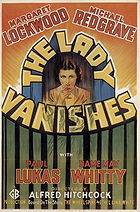 Posted : 16 years, 11 months ago on 21 July 2008 03:35
(A review of The Lady Vanishes)
Posted : 16 years, 11 months ago on 21 July 2008 03:35
(A review of The Lady Vanishes)"The Lady Vanishes" is one of Alfred Hitchcock's early black and white films (1938) and the success of this film helped Hitchcock to be recognised in America as a talented director. He made just one more film in England after "The Lady Vanishes" then left for America where he became famous as a top director of suspense movies. "The Lady Vanishes" is a cracking comedy thriller with a notable script by Sidney Gilliatt, Frank Launder and Alma Reville (Hitchcock's wife). Mainly set on a train snowbound in the Swiss Alps Iris Henderson (Margaret Lockwood) befriends Miss Froy (Dame May Whitty). Miss Froy then mysteriously vanishes and no one on the train will admit seeing her (although many of them did in fact meet her they each have their own reasons to keep quiet about it). Iris manages to persuade fellow traveller Gilbert Redman (Michael Redgrave in his screen debut) to help her in the search. Cricket fanatics Charters and Caldicott (Basil Radford and Naunton Wayne) have seen Miss Froy on the train but are worried that an investigation into her disappearance might delay them getting to Manchester in time for their beloved Test Match so they decide to stay silent. Dr Hartz (Paul Lucas) tries to convince Iris that she is mistaken and has imagined the entire episode due to a blow on the head she received prior to the train journey. Several other passengers on the train also saw Miss Froy but do not want to be involved which confuses our heroine and places her in great danger as the journey progresses. The film was remade in colour in 1979 with Elliott Gould and Cybill Shepherd but the Hitchcock version is still the best in my opinion. For anyone interested in spotting Hitchcock's regular cameo appearance this comes right at the end of the film when Lockwood and Redgrave arrive back in London. (Hitchcock can be seen at Victoria Station wearing a black coat and smoking a cigar). Radford and Wayne were so popular as Charters and Caldicott that they reprised these characters in other films.
Favourite lines:
Margaret Lockwood (on phone to hotel manager): "Boris, Miss Henderson speaking. Look, someone upstairs is playing musical chairs with an elephant. Move one of them out will you? I want to get some sleep".
Lockwood: "I've no regrets. I've been everywhere and done everything. I've eaten caviar at Cannes, sausage rolls at the dogs. I've played baccarat at Biarritz, and darts with the rural dean. What is there left for me but marriage?".
Lockwood (to Michael Redgrave): "You're the most contemptible person I've ever met in all my life".
Basil Radford (on the phone to London): "I'm enquiring about the Test Match in Manchester. Cricket, sir, cricket! What! You don't know! You can't be in England and not know the Test score!".
Lockwood (to Basil Radford and Naunton Wayne): "Well, I don't see how a thing like cricket can make you forget seeing people". Radford: "Oh, don't you? Well, if that's your attitude there's obviously nothing more to be said".
Lockwood (to Redgrave): "I know there's a Miss Froy - she's as real as you are".
Favourite lines:
Margaret Lockwood (on phone to hotel manager): "Boris, Miss Henderson speaking. Look, someone upstairs is playing musical chairs with an elephant. Move one of them out will you? I want to get some sleep".
Lockwood: "I've no regrets. I've been everywhere and done everything. I've eaten caviar at Cannes, sausage rolls at the dogs. I've played baccarat at Biarritz, and darts with the rural dean. What is there left for me but marriage?".
Lockwood (to Michael Redgrave): "You're the most contemptible person I've ever met in all my life".
Basil Radford (on the phone to London): "I'm enquiring about the Test Match in Manchester. Cricket, sir, cricket! What! You don't know! You can't be in England and not know the Test score!".
Lockwood (to Basil Radford and Naunton Wayne): "Well, I don't see how a thing like cricket can make you forget seeing people". Radford: "Oh, don't you? Well, if that's your attitude there's obviously nothing more to be said".
Lockwood (to Redgrave): "I know there's a Miss Froy - she's as real as you are".
 0 comments, Reply to this entry
0 comments, Reply to this entry
ROAD TO UTOPIA
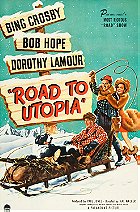 Posted : 16 years, 11 months ago on 21 July 2008 10:56
(A review of Road to Utopia)
Posted : 16 years, 11 months ago on 21 July 2008 10:56
(A review of Road to Utopia)Bob Hope, Bing Crosby and Dorothy Lamour made seven "Road" films in total and all were great entertainment and worth seeing (except perhaps their last one "Road To Hong Kong" (1962) which is generally agreed was something of a disappointment and not up to the standard of the others). However, "Road to Utopia" was a delight and one of the best. The film is very fast moving with gag following gag, talking animals, Bob Hope's remarks to the camera, and even has comedian Robert Benchley interrupting proceedings to give a running commentary on the film as it progresses! Dorothy Lamour provides the glamour and adds a song or two. Duke Johnson (Bing Crosby) and Chester Hooton (Bob Hope) are struggling entertainers down on their luck who travel to Alaska. Killers Sperry and McGurk steal a vital map showing the location of a gold mine. Our two heroes manage to obtain the map and decide to impersonate Sperry and McGurk which leads them into more trouble than they could have imagined. Along the way they meet saloon singer Sal Van Hoyden (Dorothy Lamour) and as usual both men compete for her charms. With the real Sperry and McGurk hot on their trail plus other assorted villains after them Hope and Crosby get into many tight corners but they still find time for some great songs including "Put It There Pal" which is a typical Hope-Crosby number. As a teenager I would wait eagerly with anticipation for each new Bob Hope picture to arrive at our local cinema. They didn't always come up to expectations but if it was a "Road" picture then I was pretty sure it would be O.K. Bob Hope and Bing Crosby were two of the biggest stars of Hollywood in the 30s and 40s and although the "Road" films never won any Oscars they certainly brought an enormous amount of pleasure to lots of people and can still be enjoyed today.
Favourite lines:
Bob Hope (to Bing Crosby): "I didn't think there was one more way to get the cops after us but you found it".
Hope (to Crosby): "Next time I'll bring Sinatra". (When Bing loses a talent contest on board ship).
Hope (to Crosby): "It may be a mountain to you but it's bread and butter to me".
Hope (to Douglass Dumbrille): "I'll take a lemonade .... in a dirty glass!".
Hope (to audience): "We adopted him!".
For a more detailed look at the "Road" series of films you might be interested in a splendid book by Randall G. Mielke entitled "The Road to Box Office: the Seven Film Comedies of Bing Crosby, Bob Hope and Dorothy Lamour, 1940-1962". I enjoyed it very much as it gives full coverage of all the movies and biographical details on the leading players. Recommended.
Favourite lines:
Bob Hope (to Bing Crosby): "I didn't think there was one more way to get the cops after us but you found it".
Hope (to Crosby): "Next time I'll bring Sinatra". (When Bing loses a talent contest on board ship).
Hope (to Crosby): "It may be a mountain to you but it's bread and butter to me".
Hope (to Douglass Dumbrille): "I'll take a lemonade .... in a dirty glass!".
Hope (to audience): "We adopted him!".
For a more detailed look at the "Road" series of films you might be interested in a splendid book by Randall G. Mielke entitled "The Road to Box Office: the Seven Film Comedies of Bing Crosby, Bob Hope and Dorothy Lamour, 1940-1962". I enjoyed it very much as it gives full coverage of all the movies and biographical details on the leading players. Recommended.
 0 comments, Reply to this entry
0 comments, Reply to this entry
SUNSET BOULEVARD
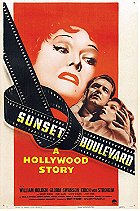 Posted : 16 years, 11 months ago on 21 July 2008 09:53
(A review of Sunset Boulevard)
Posted : 16 years, 11 months ago on 21 July 2008 09:53
(A review of Sunset Boulevard)Joe Gillis (William Holden) is a struggling young Hollywood screenwriter who accidentally drives into the grounds of a big old house on Sunset Boulevard while trying to get away from two men intent on repossessing his car as he is behind with his payments. The owner of the house is old time movie actress Norma Desmond (Gloria Swanson) now forgotten by the public but who used to be big. ("I am big. It's the pictures that got small"). Gillis tells her he is a Hollywood scriptwriter so she offers him a job to help her complete a script which she hopes will enable her to make a glorious "comeback" to the silver screen. The script is in fact so bad it would be unfilmable and although at first reluctant Gillis decides he will take advantage of the situation he has found himself in by agreeing to help with Norma's script. He realises that this will be a unique opportunity for him to hide from his creditors in this big house and live there rent free and also get paid while making a pretense of working on the script. Also living in the house is Norma's manservant and chauffeur Max (Erich von Stroheim) who helps to protect Norma from the realities of modern life and feeds her ego that she is still a great star. ("Madam is the greatest star of them all"). Gillis eventually starts to feel trapped and virtually becomes a prisoner in the house when he realises that Norma is becoming more and more infatuated with him (although he is years younger than her) and she becomes more possessive as the weeks go by. Gillis decides the time has now come to leave the house and return to his previous life but that is easier said than done when Norma Desmond has such a hold over him. At the Academy Awards that year "Sunset Boulevard" was deservedly nominated for the Best Picture Award but lost to "All About Eve". Billy Wilder was nominated as Best Director but lost to Joseph L. Mankiewicz for "All About Eve". William Holden was nominated as Best Actor but lost to Jose Ferrer for "Cyrano de Bergerac". Gloria Swanson was nominated as Best Actress (and surely should have won) but she lost to Judy Holliday for "Born Yesterday". This must have been a bitter disappointment for Billy Wilder when the film received so many nominations and yet only managed to come away with Oscars for Best Story and Screenplay, Best Score and Best Art Direction/Set Direction. The original choice for the part of Joe Gillis (played in the film by William Holden) was Montgomery Clift but he turned it down. The role was then offered to George Raft who also passed. However, William Holden was fantastic in the part I thought and his excellent performance in this film led to being offered many more prestigious leading roles. He worked once again with Billy Wilder in "Stalag 17" and "Sabrina". The role of Norma Desmond was first offered to Mary Pickford, Mae Murray and even Mae West before Swanson came under consideration. Gloria Swanson had not made a film for many years when she accepted the part in "Sunset Boulevard" so she was perfectly cast as Norma Desmond. I have always thought it rather amusing that although Erich von Stroheim played Norma Desmond's manservant and chauffeur in the film he could not actually drive in real life. So for the famous scene where he "drives" Norma and Joe through the Paramount gates the car was in fact being pushed along by crew members!
Favourite lines:
William Holden: "The poor dope. He always wanted a pool. Well in the end he got himself a pool - only the price turned out to be a little high".
Holden: "Audiences don't know somebody sits down and writes a picture. They think the actors make it up as they go along".
Gloria Swanson (to Holden): "Still wonderful isn't it? And no dialogue - we didn't need dialogue. We had faces".
Swanson: "All right Mr De Mille, I'm ready for my close up".
Favourite lines:
William Holden: "The poor dope. He always wanted a pool. Well in the end he got himself a pool - only the price turned out to be a little high".
Holden: "Audiences don't know somebody sits down and writes a picture. They think the actors make it up as they go along".
Gloria Swanson (to Holden): "Still wonderful isn't it? And no dialogue - we didn't need dialogue. We had faces".
Swanson: "All right Mr De Mille, I'm ready for my close up".
 0 comments, Reply to this entry
0 comments, Reply to this entry
THE MUSIC MAN
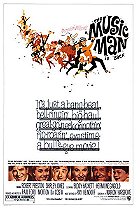 Posted : 16 years, 11 months ago on 21 July 2008 07:38
(A review of The Music Man)
Posted : 16 years, 11 months ago on 21 July 2008 07:38
(A review of The Music Man)Professor Harold Hill (Robert Preston) arrives in River City with a plan to make some money from the gullible citizens. He tells them he is organising a River City boy's band with the intention of leaving town with their money before the instruments arrive. He hasn't allowed for the fact that he will meet beautiful librarian Marian Paroo (Shirley Jones) and fall for her charms. Marian is at first very suspicious of Hill and then begins to realise he is doing a lot of good things for River City. Hill changes his plan, decides to stay and against all the odds manages to form the boy's band. The high class supporting cast includes Buddy Hackett, Paul Ford (who played the frustrated - and sometimes exasperated - Colonel Hall in the "Sergeant Bilko" TV series), Hermoine Gingold, a very young Ron Howard (only eight years old at the time, and now of course a respected film director), Harry Hickox, Percy Helton, Max Showalter and Pert Kelton. The film contained so many outstanding characters it is difficult to know where to start. Robert Preston of course was ideally cast as Harold Hill - it was definitely the best role of his career and the one he is most fondly remembered for. He worked tremendously hard, put his songs over with style and enthusiasm, was full of energy, and seemed to be enjoying himself enormously. The delightful Shirley Jones gave another captivating performance as Marian the librarian and sang several engaging songs throughout the film. Paul Ford was brilliant as Mayor Shinn and had many comic moments trying to get Hill run out of town or sent to jail. Buddy Hackett as Hill's friend Marcellus gets involved with the phoney plan to form the band and does his best to keep Hill out of trouble. Ron Howard impresses with his featured number "Gary, Indiana" (which for the sake of the plot he had to sing with a lisp!). Two of my favourite character actors were in the film (Percy Helton and Max Showalter). Unfortunately they both only appeared briefly in the opening number which was a shame as I would have liked to see them do more. Max Showalter was previously known as Casey Adams and had appeared with Marilyn Monroe in "Niagara" and "Bus Stop" plus many other films. The "Buffalo Bills" barbershop quartet close harmony group sing some nostalgic numbers which are very enjoyable and help to establish the period atmosphere of the film. Director Morton Da Costa introduced the gimmick of having the screen go dark after several of the numbers which I thought was a clever innovation. Even though Robert Preston had played the role of Harold Hill on Broadway with great success for 1375 performances Frank Sinatra was Warner Bros first choice for the film. However, they were told quite firmly by Meredith Willson (he wrote the book, words and music): "No Robert Preston, no movie!".
Songs include: "You've Got Trouble Right Here in River City", "The Sadder but Wiser Girl for Me", "Till There Was You", "Goodnight my Someone", "Wells Fargo Wagon", "Marian the Librarian", "Gary, Indiana" and of course the big show stopper "Seventy Six Trombones". There was a TV version of "The Music Man" in 2003 with Matthew Broderick. Although I admire this actor and have enjoyed much of his work this was a part that belongs firmly with Robert Preston and for anyone else to take it on is a mistake.
Favourite lines:
Robert Preston (to Buddy Hackett): "Must create a desperate need in your town for a boy's band".
Preston: "Ladies and gentlemen, either you are closing your eyes to a situation you do not wish to acknowledge, or you are not aware of the calibre of disaster indicated by the presence of a pool table in your community!".
Shirley Jones (to Paul Ford): "Honestly, a bunch of grown men. Along comes this fly by night salesman and you're all taken in".
Paul Ford: "I want that man's credentials".
Preston: "Think, boys. Think!".
Preston (to Jones and Ron Howard): "Well, for the first time in my life - I got my foot caught in the door".
Songs include: "You've Got Trouble Right Here in River City", "The Sadder but Wiser Girl for Me", "Till There Was You", "Goodnight my Someone", "Wells Fargo Wagon", "Marian the Librarian", "Gary, Indiana" and of course the big show stopper "Seventy Six Trombones". There was a TV version of "The Music Man" in 2003 with Matthew Broderick. Although I admire this actor and have enjoyed much of his work this was a part that belongs firmly with Robert Preston and for anyone else to take it on is a mistake.
Favourite lines:
Robert Preston (to Buddy Hackett): "Must create a desperate need in your town for a boy's band".
Preston: "Ladies and gentlemen, either you are closing your eyes to a situation you do not wish to acknowledge, or you are not aware of the calibre of disaster indicated by the presence of a pool table in your community!".
Shirley Jones (to Paul Ford): "Honestly, a bunch of grown men. Along comes this fly by night salesman and you're all taken in".
Paul Ford: "I want that man's credentials".
Preston: "Think, boys. Think!".
Preston (to Jones and Ron Howard): "Well, for the first time in my life - I got my foot caught in the door".
 0 comments, Reply to this entry
0 comments, Reply to this entry
DOUBLE INDEMNITY
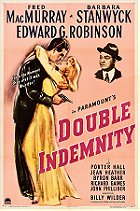 Posted : 16 years, 11 months ago on 20 July 2008 06:09
(A review of Double Indemnity )
Posted : 16 years, 11 months ago on 20 July 2008 06:09
(A review of Double Indemnity )"Double Indemnity" is yet another Billy Wilder classic and has a strong position in my "Top Ten" films list!! Told mostly in flashback the film holds your attention throughout with its crackling dialogue, impeccable acting from the principals and a plot full of suspense. The screenplay was written by Wilder (and Raymond Chandler) from the book by James M. Cain who also wrote "The Postman Always Rings Twice". It is amazing to realise that it was released as long ago as 1944 but the film still stands up well today and hasn't really dated at all. It was a complete change of pace for Fred MacMurray who had to be persuaded by Wilder to do the film. Both George Raft and Brian Donlevy were considered before MacMurray. Raft was interested but wanted to change his character into an FBI agent so of course Wilder couldn't go along with that and Raft lost the opportunity of being in a classic film! Dick Powell was desperate to secure the leading role in this film after he had read an advance copy of the script but he was under contract to RKO and they refused to loan him out to Paramount so he was unlucky. Edward G. Robinson as insurance investigator Barton Keyes was absolutely brilliant and dominated every scene he was in. Barbara Stanwyck as Phyllis Dietrichson was breathtaking and this was without doubt one of her best roles ever. "Double Indemnity" had a particularly strong supporting cast including Porter Hall, Richard Gaines, Tom Powers, Jean Heather, Byron Barr and Fortunio Bonanova. Trivia note: Some reviews have listed Gig Young as being in the film but that is not correct. Young's real name was Byron Barr (another actor who was in the film) so that is probably how the error occurred. "Double Indemnity" was remade in 1973 as a TV movie in colour with Richard Crenna, Lee J. Cobb and Samantha Eggar but this doesn't come close to the Wilder version. Wilder originally filmed a different ending where Walter Neff goes to the gas chamber but this was never used.
Favourite lines:
Fred MacMurray (in dictaphone message to Edward G. Robinson): "Walter Neff. Insurance salesman, 35 years old, unmarried, no visible scars - until a while ago that is".
Fred MacMurray (in same dictaphone message): "I killed him for money and for a woman. And I didn't get the money and I didn't get the woman. Pretty, isn't it?"
Barbara Stanwyck (to MacMurray): "There's a speed limit in this state Mr Neff, 45 miles an hour".
MacMurray (to Stanwyck): "I think you're swell - as long as I'm not your husband!".
Edward G. Robinson (to Richard Gaines): "No soap Mr. Norton - we're sunk and we'll have to pay through the nose, and you know it!".
Robinson (to MacMurray): "You'll never even make the elevator!".
Favourite lines:
Fred MacMurray (in dictaphone message to Edward G. Robinson): "Walter Neff. Insurance salesman, 35 years old, unmarried, no visible scars - until a while ago that is".
Fred MacMurray (in same dictaphone message): "I killed him for money and for a woman. And I didn't get the money and I didn't get the woman. Pretty, isn't it?"
Barbara Stanwyck (to MacMurray): "There's a speed limit in this state Mr Neff, 45 miles an hour".
MacMurray (to Stanwyck): "I think you're swell - as long as I'm not your husband!".
Edward G. Robinson (to Richard Gaines): "No soap Mr. Norton - we're sunk and we'll have to pay through the nose, and you know it!".
Robinson (to MacMurray): "You'll never even make the elevator!".
 0 comments, Reply to this entry
0 comments, Reply to this entry
A BIG HAND FOR THE LITTLE LADY
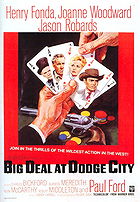 Posted : 16 years, 11 months ago on 20 July 2008 11:33
(A review of A Big Hand for the Little Lady)
Posted : 16 years, 11 months ago on 20 July 2008 11:33
(A review of A Big Hand for the Little Lady)This is a most unusual film which on the face of it appears to be a Western but how can this be when there is no gunfight on the town's main street, no saloon fights or bar room brawls, no sheriff to keep order and put the bad guys in jail, no Indians - in fact not much action of any kind that would usually be associated with a Western film. So what is the appeal of this extraordinary film where most of the story takes place during a long drawn out card game in the back room of the town's hotel? The tension mounts as stranger in town Henry Fonda is tempted to get into the high stakes poker game with some wealthy cattlemen after he had promised his wife (Joanne Woodward) that he would give up gambling. Obviously, he does join the game and is convinced that he has been dealt a hand that can't lose but the other players in the game also have good hands that each one feels could be the winner. Who is bluffing who? Can Fonda risk losing all the family savings of his wife and young son? Will the stakes go too high for Fonda to stay in the game? Can wife Joanne Woodward persuade Fonda to see sense and walk away? Surprise is piled upon surprise as the game progresses and the final twist is a beauty! What holds your interest is the finely plotted screenplay written by Sidney Carroll and magnificent acting from the entire cast. Henry Fonda and Joanne Woodward are wonderful in the lead roles and are admirably supported by a fantastic cast including Jason Robards Jr, Charles Bickford, Kevin McCarthy, Burgess Meredith, Robert Middleton and Paul Ford. Competently directed by Fielder Cook it grips your attention throughout and then packs a totally unexpected surprise ending that will delight you! Upon release in the U.K. the title was changed to "Big Deal in Dodge City".
Favourite lines:
Henry Fonda (to Joanne Woodward): "I got a hand of cards here comes once in a lifetime".
Woodward (to card players): "How do you play this game?".
Paul Ford (to Woodward): "Nobody sees those cards but you and C. P. Ballinger".
Favourite lines:
Henry Fonda (to Joanne Woodward): "I got a hand of cards here comes once in a lifetime".
Woodward (to card players): "How do you play this game?".
Paul Ford (to Woodward): "Nobody sees those cards but you and C. P. Ballinger".
 0 comments, Reply to this entry
0 comments, Reply to this entry
 Login
Login
 Home
Home 30 Lists
30 Lists 41 Reviews
41 Reviews Collections
Collections